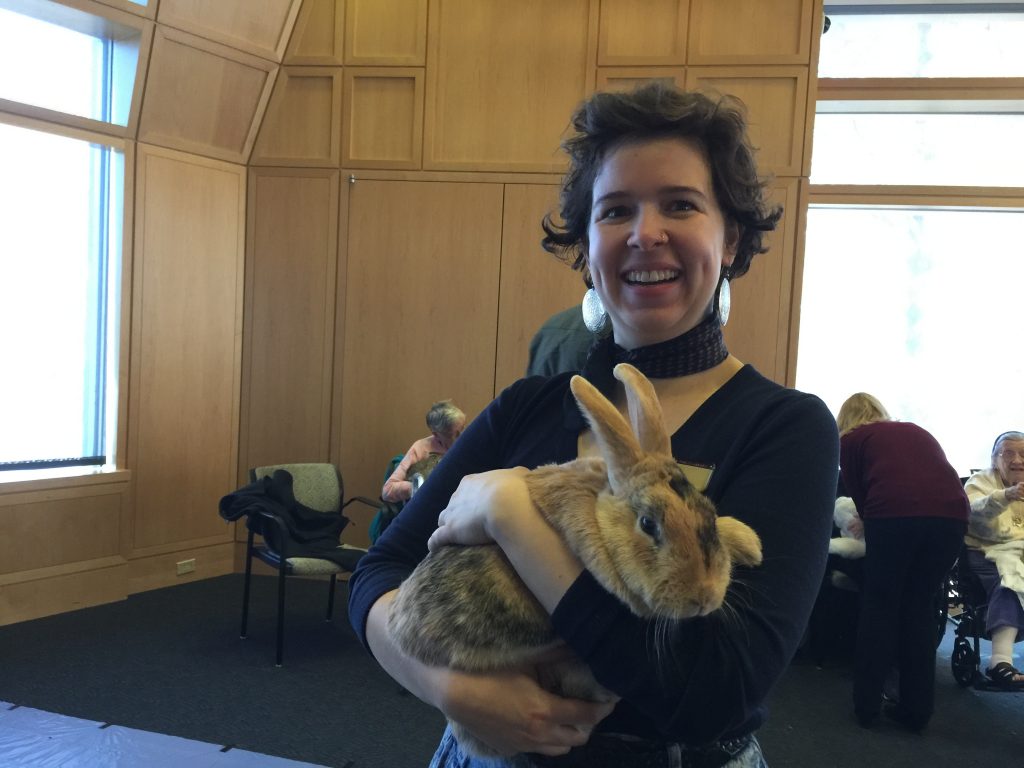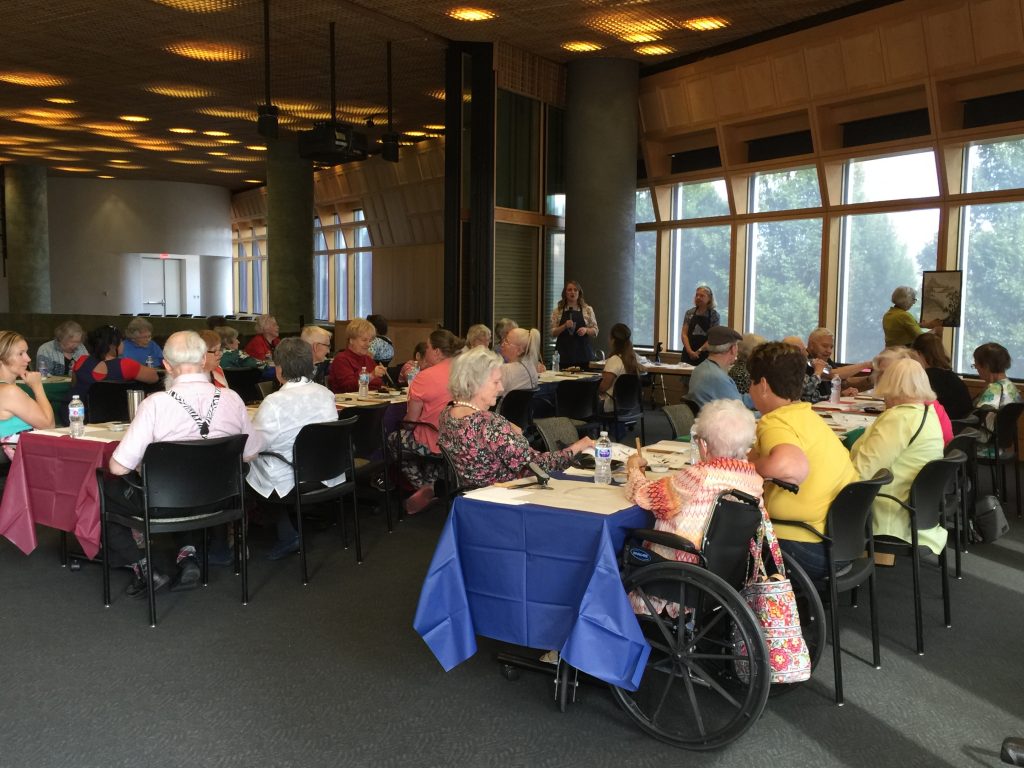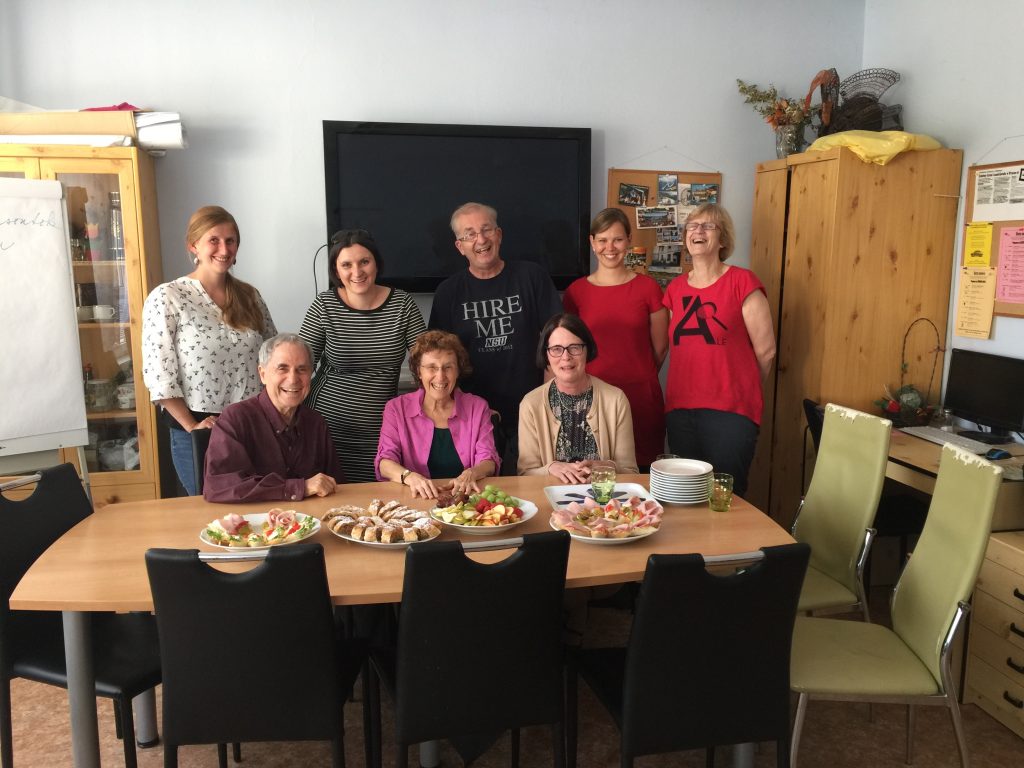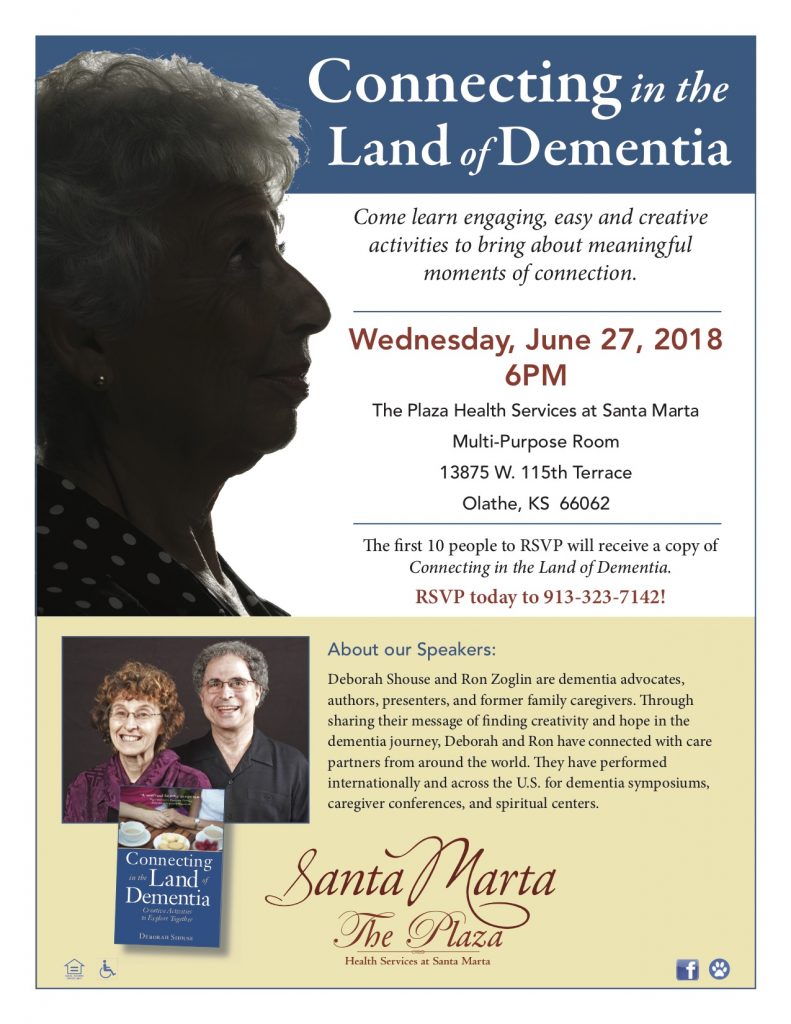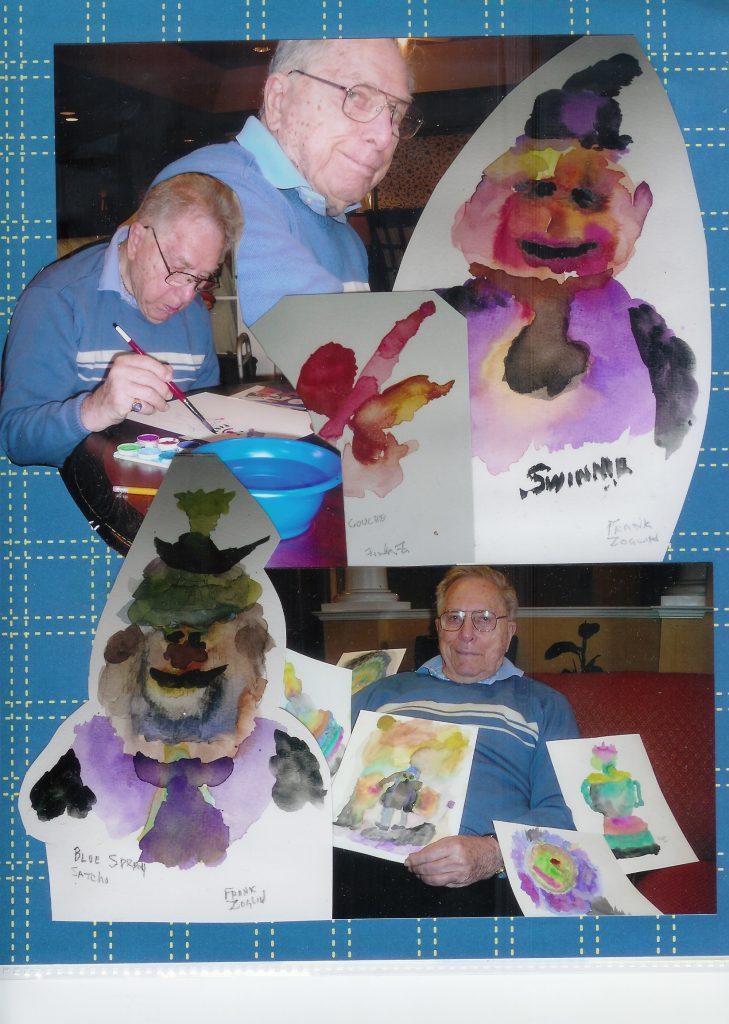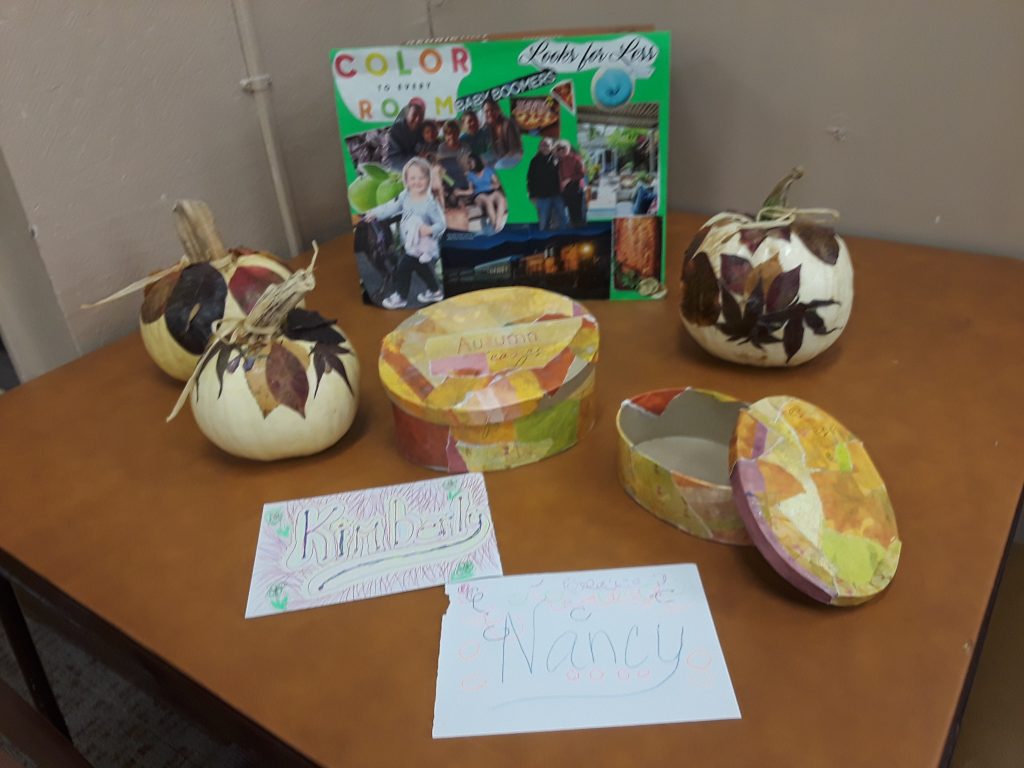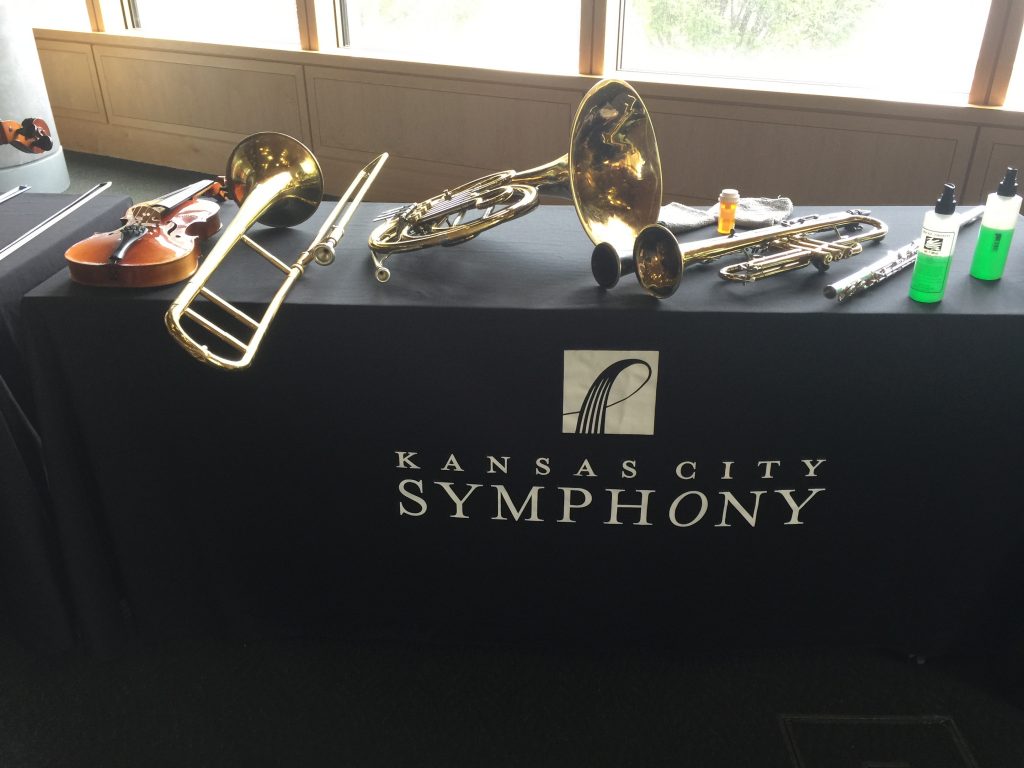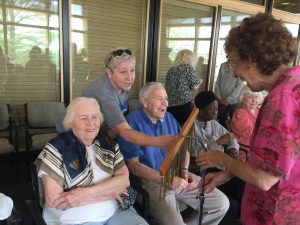Posts Tagged ‘Alzheimer’s Caregiving’
KC Memory Cafe: The Goat and Pony Show
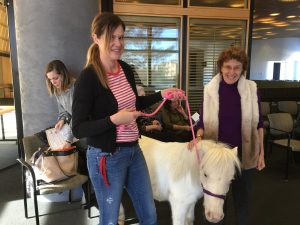 One of the stars of November’s KC Memory Cafe was a miniature horse. It’s not every day that a white horse and a couple of black goats visit the Plaza Library, accompanied by exotic bunnies and silky chickens. But these friendly animals, brought to us by the Paramount Petting Zoo, captivated all our attendees.
One of the stars of November’s KC Memory Cafe was a miniature horse. It’s not every day that a white horse and a couple of black goats visit the Plaza Library, accompanied by exotic bunnies and silky chickens. But these friendly animals, brought to us by the Paramount Petting Zoo, captivated all our attendees.
“These animals love to be held and petted,” their keepers told us. They instantly snuggled into people’s arms and were in no hurry to leave. Our attendees were filled with a magical sense of connection and relaxation, mixed in with the thrill of meeting all these new animals.
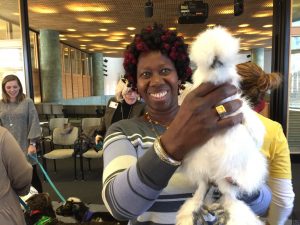 “Animals fill us with excitement, and give us something to talk about,” says Mandy Shoemaker, co-founder of Prairie Elder Care. Mandy’s organization is part of the esteemed Eden Alternative, a national movement dedicated to reducing loneliness, helplessness, and boredom through loving companionship and meaningful engagement.
“Animals fill us with excitement, and give us something to talk about,” says Mandy Shoemaker, co-founder of Prairie Elder Care. Mandy’s organization is part of the esteemed Eden Alternative, a national movement dedicated to reducing loneliness, helplessness, and boredom through loving companionship and meaningful engagement.
“Animals give us a connection,” she says.
We could see and feel that connection as we all enjoyed feeding the goats, petting the horse, and cuddling with the bunnies and the chickens. We also shared farm memories and Mandy asked, “How many of you ever thought you’d be holding a chicken in your lap?”
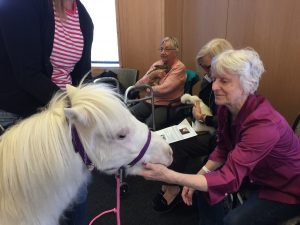 For most, it was a unique experience, one they did not tire of. For some,
For most, it was a unique experience, one they did not tire of. For some, 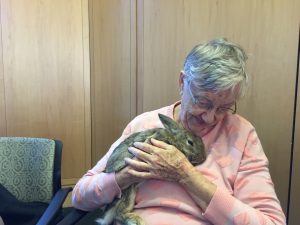 parting with their loving chicken or bunny was like saying good-bye to a dear friend.
parting with their loving chicken or bunny was like saying good-bye to a dear friend.
To meet the animals, click here.
Deborah Shouse is the author of Connecting in the Land of Dementia: Creative Activities to Explore Together and Love in the Land of Dementia: Finding Hope in the Caregiver’s Journey.
Eight Steps to Help People Living with Dementia Feel at Ease during Holiday Gatherings
As we move into the holiday season, Ron and I think often of our parents who went through their last holidays with dementia: my mom Frances and his father Frank. We wanted to share the season with them in ways that felt safe, comfortable, and honoring so we gradually developed these tips. Recently, we shared the tips via email and had such a great response we also want to share them with you.
Several people wrote, “These ideas are good for anyone, not just those with memory loss.”
What great wisdom–to treat each person with the tenderness and consideration that we often reserve for someone going through a physical or emotional illness.
We’d like to share our tips and we’d like to learn from you: what other suggestions do you have for helping people feel connected at gatherings?
Eight Steps to Help People Living with Dementia Feel at Ease during Holiday Gatherings
- When you’re in a group, help the person living with dementia feel safe and comfortable by having a trusted friend or family member stay beside him or her, explaining the proceedings and fielding questions from others, as needed.
- Encourage people to say their name and maintain eye contact when conversing with the person who is living with dementia.
- Make sure the person can come and go from the group as needed. Create a quiet space where he or she can rest — or appoint a caring person to drive your loved one home when he tires of the festivities.
- Have something special for them to look at, like a family photo album or a favorite magazine.
- Choose background music that is familiar to them, music of their era played in a style they resonate with.
- Prepare a few of their favorite foods.
- When talking to them, don’t correct or contradict or try to pull them into the current reality. Simply listen carefully and let them talk.
- Appreciate them for who they are right now.
Here’s to a holiday season filled with grace, gratitude and generosity.
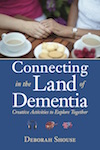
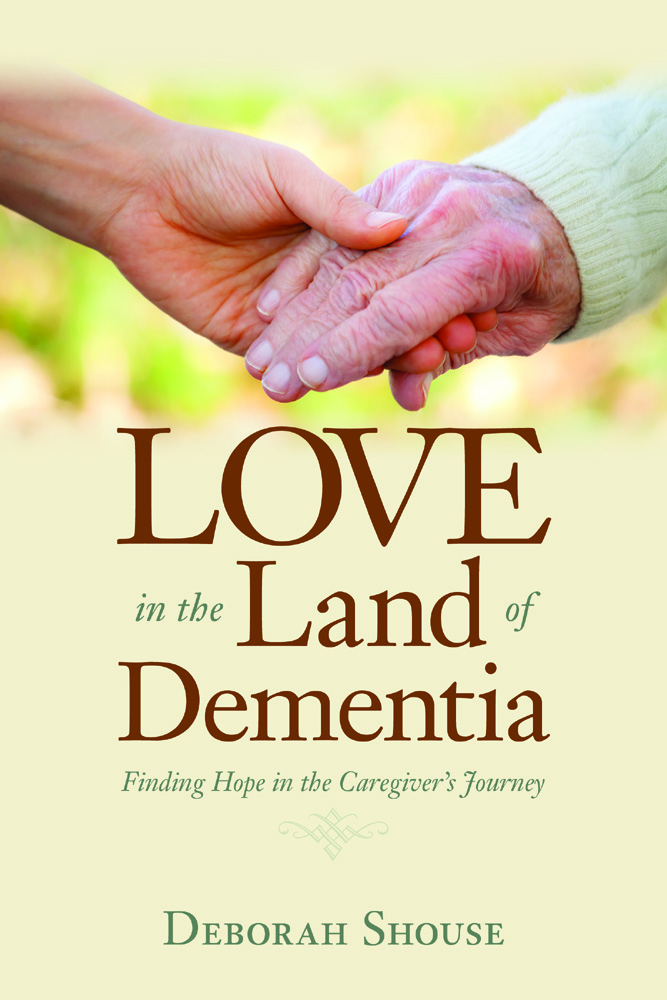
Deborah Shouse is the author of Love in the Land of Dementia: Finding Hope in the Caregiver’s Journey.
Dementia Arts to Draw us Together
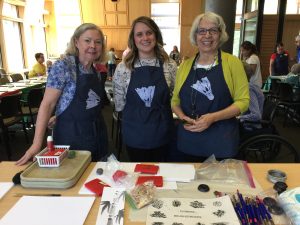 September’s Memory Cafe featured a lively team of educators from the Nelson-Atkins Museum of Art. Using the arts to draw us together, they showed us the Chinese art form of painting pictures of bamboo. About fifty of us gathered in the the library’s spacious lower level. Colorful plastic cloths covered our tables, making it easy to distinguish our drawing paper and painting supplies.
September’s Memory Cafe featured a lively team of educators from the Nelson-Atkins Museum of Art. Using the arts to draw us together, they showed us the Chinese art form of painting pictures of bamboo. About fifty of us gathered in the the library’s spacious lower level. Colorful plastic cloths covered our tables, making it easy to distinguish our drawing paper and painting supplies. 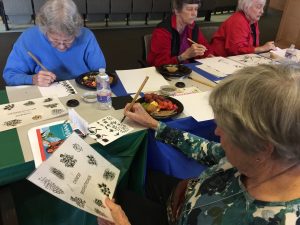 All of us eagerly dipped our special bamboo brushes into the ebony paint and made short pushing movements, replicating segments of the plant’s stalk. Then our educators showed us drawings of bamboo foliage and we experimented with wispy thin lines of leaves.
All of us eagerly dipped our special bamboo brushes into the ebony paint and made short pushing movements, replicating segments of the plant’s stalk. Then our educators showed us drawings of bamboo foliage and we experimented with wispy thin lines of leaves.
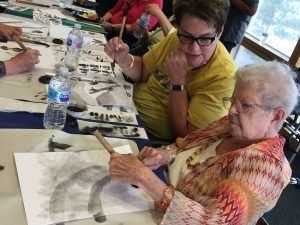 Our common ground continued as our teacher said, “Now, we’re going to pass out large sheets of paper.” We all oohed and aahed and let our strokes grow larger and more confident. At the end, each person created a design in a small wedge of clay, pressed the clay into a red stamp pad, and adorned the painting with our own personal “signature.”
Our common ground continued as our teacher said, “Now, we’re going to pass out large sheets of paper.” We all oohed and aahed and let our strokes grow larger and more confident. At the end, each person created a design in a small wedge of clay, pressed the clay into a red stamp pad, and adorned the painting with our own personal “signature.”• To add extra meaning, connect the artistic activity with something in your partner’s past.
• Invite an intergenerational mixture of artists, from children, grandchildren, art students, and volunteers to join your partner and add encouragement. 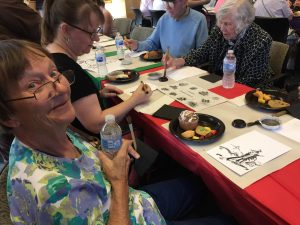
• Create a variety of art-related activities, including visiting galleries or looking at pictures from magazines, as well as painting, drawing or various media.


Czech Mates in Dementia Care: Laughter Yoga in Prague
The table was spread with an array of Czech delicacies: apple strudel, special sandwiches with flowers of ham atop fresh baguettes, a bountiful tray of strawberries, grapes, and apple slices. 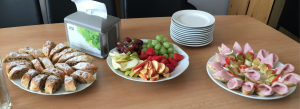
“This is the way we welcome people here in Prague,” said Lucie Hajkova, social worker and coordinator of respite care for the Czech Alzheimer’s Society.
Ron and I were visiting the Gerontological Centre and the Czech Alzheimer’s Society, which are both housed in the same building. The two organizations work together to offer clients everything they need, from psychological counseling, to memory testing, to social work services, to healthcare. We came to learn and to present a laughter yoga session.
We gathered with staff members around the table to learn about the center, which was started in 1997 by Iva 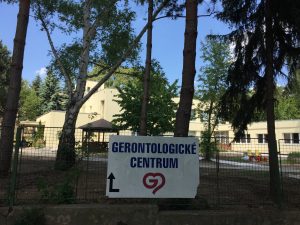 Holmerova, MD. along with Hana Janeckova, PhD. Hana was putting together training materials for caregivers when she was contacted by Alzheimer’s Disease International. They wanted to know more about her work and they invited her to an international conference in Jerusalem. That conference was a turning point. Hana left it inspired and determined to help Czech families that were dealing with dementia. She contacted Iva and both saw the need to offer education, diagnosis, support, and care for people living with dementia and their families in the Czech Republic. Today, both centers are flourishing.
Holmerova, MD. along with Hana Janeckova, PhD. Hana was putting together training materials for caregivers when she was contacted by Alzheimer’s Disease International. They wanted to know more about her work and they invited her to an international conference in Jerusalem. That conference was a turning point. Hana left it inspired and determined to help Czech families that were dealing with dementia. She contacted Iva and both saw the need to offer education, diagnosis, support, and care for people living with dementia and their families in the Czech Republic. Today, both centers are flourishing.
We were impressed with the dementia services they offered, which included home care for people who need help with bathing, dressing, eating, exercise or more. The building holds a respite center. When families need renewal time, or when people living with dementia need extra care or healing time, they can stay in respite for up to a month. The Centre also hosts a day program that offers a variety of activities in a homey and comfortable setting,
Even more impressive than the Society’s services were its staff. Each had a passion for this work, a love for those who are living with dementia, and a compassion for their families.
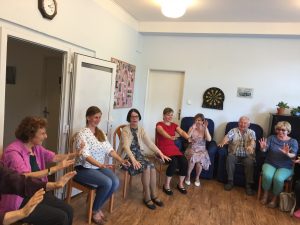
We had a wonderful time sharing a laughing session at the day center—our first international facilitation. We sat in a beautiful circle of people living with dementia, staff, family, and friends. We couldn’t have done it without our translator, Eliska, who captured the energy and essence of what we were saying. And once we all started laughing, we were beyond the constraints of language. Click here to experience a bit of laughter in Prague.
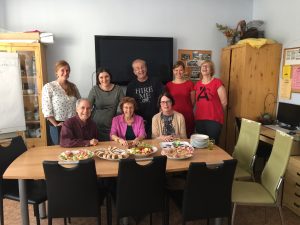
Photo Caption:
Eliska Brouckova, psychologist, consultant/advisor for people with dementia and their care givers
Martina Matlova, Director
Petr Veleta, PhD, dancer, dance therapist
Marketa Splichalova, psychologist, consultant/advisor for people with dementia and their care givers
Eva Jarolimova, PhD, psychologist, consultant for people with dementia and their care givers
Hana Janeckova, PhD, co- founder of the Czech Alzheimer Society, head of governing board of Czech Alzheimer Society, University teacher, researcher
Lucie Hajkova, social worker, coordinator of respite care in homes of people with dementia.


International Insights: Caring in Croatia
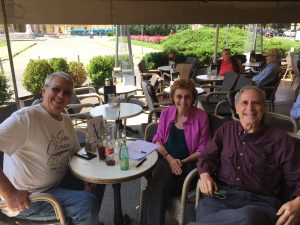 Even before Tomislav (Tom) Huić, Vice president of Alzheimer Croatia had a personal involvement with dementia, he was helping the Croatia Alzheimer’s Society with their marketing. As a professional marketer and co-founder of a successful ad agency, he wanted to help the fledgling, all-volunteer non-profit, and he often offered them his professional expertise. Then his mother began having memory issues and Tom became more involved. Today, he is one of the three full-time volunteers who run the 20-year-old agency.
Even before Tomislav (Tom) Huić, Vice president of Alzheimer Croatia had a personal involvement with dementia, he was helping the Croatia Alzheimer’s Society with their marketing. As a professional marketer and co-founder of a successful ad agency, he wanted to help the fledgling, all-volunteer non-profit, and he often offered them his professional expertise. Then his mother began having memory issues and Tom became more involved. Today, he is one of the three full-time volunteers who run the 20-year-old agency.
We met with Tom at the Hemingway Bar and Cafe in Zagreb, Croatia, 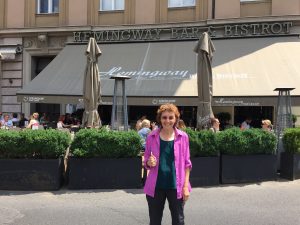 wanting to learn more about ways the society was educating and assisting people across the country and the region.
wanting to learn more about ways the society was educating and assisting people across the country and the region.
“Every year, we offer a professional workshop,” he says. That workshop, plus donations, provides the Association’s only operating money.
Tom understands the importance of collaboration and education. With a grant from the European Union, he and partners created dementia training materials for nurses. They presented the information to healthcare professionals in parts of Croatia and Slovenia. The programs were well received and he is working on presenting them in other parts of the region.
Tom also created a partnership with pharmacists in Zagreb. When elders came in to pick up medications, they were invited to take a short cognition exam. Sixty percent of the participants failed the test and they were given contact information for the Society. But only a handful of those contacted Tom and his team.
“We still have stigma here,” Tom says. “Plus, many people mistakenly think memory impairment is a natural part of growing older.”
They are collaborating with nursing homes and with governmental health agencies to provide guidelines for memory care beds.
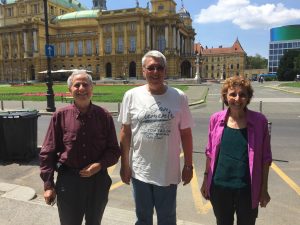 No money. No budget. Lots of ideas. Too few people and too few finances to implement them. The task ahead of Alzheimer Croatia seems daunting. But Tom and his team are not daunted. They are educating family and professional care partners through a variety of pathways, offering much needed information and support.
No money. No budget. Lots of ideas. Too few people and too few finances to implement them. The task ahead of Alzheimer Croatia seems daunting. But Tom and his team are not daunted. They are educating family and professional care partners through a variety of pathways, offering much needed information and support.


One-Minute Tips to Boost Your Happiness
I am thrilled to be a contributor to Chicken Soup’s new book, The Empowered Woman. I’m going to be featured 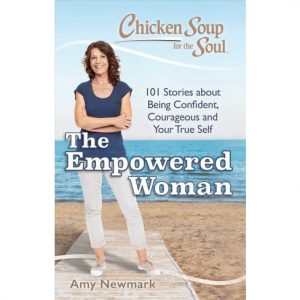 on publisher Amy Newmark’s podcast on May 25, where I talk to her about my “empowered” story and about the dementia journey. Click here to listen to the podcast. Amy is very inspiring and I wanted to share some of her One-Minute Tips to Boost Your Happiness,
on publisher Amy Newmark’s podcast on May 25, where I talk to her about my “empowered” story and about the dementia journey. Click here to listen to the podcast. Amy is very inspiring and I wanted to share some of her One-Minute Tips to Boost Your Happiness,
Speaking of empowered women, Amy Newmark left her high-powered career as a Wall Street analyst to take over the Chicken Soup series. After years of immersing herself in true stories of miracles, lessons learned, and hopes fulfilled, she wrote her own book,Simply Happy. Here are some of her “One-Minute Tips to Boost Your Happiness.”
Amy’s Insights for Care Partners
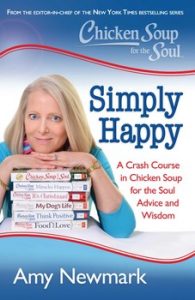 Counting Blessings Adds Up to Happiness
Counting Blessings Adds Up to Happiness
“The gateway to happiness is counting your blessings,” Amy says. “If you’re not grateful for what is in your life, how can you be happy?”
Scientific studies have proven that people who are actively grateful are happier, healthier, and more productive. Plus, they get along better with family members, colleagues, and others.
“You can easily learn gratitude,” Amy says.
To start, each day jot down three things for which you’re grateful. Strive for three different ideas each day. At the end of the month, you’ll have documented nearly a hundred blessings.
“Writing and speaking your gratefulness changes your perception,” Amy says. “You start looking for good things during the day. You can share your blessings with your partner and encourage him to consider his own.”
Some people drop the blessings into a box, and then read them at the end of the day or the end of the month.
Smiling Serves You
Smile even when you don’t feel like it. Often, when you smile, people smile back. This boosts everyone’s spirits and energy. If they don’t give you a grin, it doesn’t hurt you.
“Your smile will change the way people react to you,” Amy says.
Zipping from Zero to 60 Brings Joy
Set a timer for 60 seconds and zip through a task you’ve been putting off. File the insurance policy that sprawls across the dining room table. Unload the dishwasher. Take your vitamins.
“Doing even one of those tasks every day will lighten your spirits,” Amy says.
Dropping Perfection and Embracing Your Own Abilities
Abandon your pursuit of perfection and strive for your own version of excellence.
“When you try to be perfect, you can’t get a lot done,” Amy says. “For most of us, it’s better to do five things at 90 percent than one thing at 100 percent.”
I love Amy’s final piece of wisdom:
“Treat yourself nicely,” she says. “Use the fragrant soap you save for guests. Indulge in a rich bit of good chocolate or a fresh crisp apple. Put the good sheets you save for company on your own bed.
Give yourself a tiny pleasure every day.”
For more happiness boosts, read Simply Happy.


Connected in the Land of Dementia: Easy Ideas and Free Events
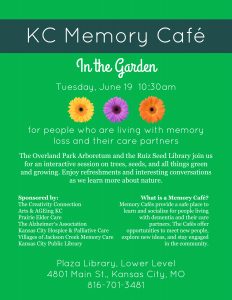
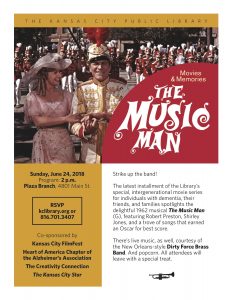


Father’s Day Tips: Four Fabulous Ways to Celebrate When Dad has Dementia
“Dad always liked a big Father’s Day celebration,” my friend told me. “But now he’s deep into dementia; I’m not sure he would notice.” When Ron’s dad Frank relaxed into dementia, Ron and I often struggled with how to approach Father’s Day. Even though Frank didn’t know what day it was, we still wanted to honor Frank as a father. Here are four fabulous ways to celebrate when Dad has dementia.
Reminiscing over Favorite Foods
We brought in a meal created from some of Franks’ current favorites and some gems from the past. Frank’s wife Mollie made her world-famous brownies and legendary rice pilaf. We bought cooked steaks and baked potatoes and as we ate, we talked about meals past. Inspired by the familiar tastes, smells and textures, Frank recited one of this favored old phrases: “I’m cool to other women but I’m hot tamale (Hot to Mollie.)”
Naming His Tunes
Frank and Mollie liked to dance occasionally and for one celebration, we printed out song lyrics and sang Frank and Mollie some of their old favorites. We didn’t sound like Sinatra or Fitzgerald as we warbled “It Had to be You,” or “Stardust” or “Three Coins in the Fountain” but we did sound sincere!
Life Stories
Ron and I created a HERO Project for Frank, a story-scrap book that incorporated highlights and photos from Frank’s life, along with a meaningful storyline. We also created one for Mollie. We read the HERO Projects with Frank and Mollie, using the stories as conversational catalysts. Frank enjoyed the experience; we enjoyed reading aloud with Frank and remembering shared experiences.
Celebrating Special Qualities and Life Lessons
As we sat together, we talked about some of Frank’s many stellar qualities, which included his easy-going nature, his natural charm, his entrepreneurial spirit, and his willingness to try new things. “Did I really do that?” Frank asked, as Ron described the bowling alley Frank and his brother owned and operated. “You did,” Ron said.“That was really something,” Frank said.
Frank’s comment summed up our Father’s Day celebration: it was really something. Just being together was wonderful. And taking time to really celebrate Frank with a tender mixture of food, photos, stories, and conversation was pure magic.
For more ideas on Naming His Tunes, please visit the exciting MusicandMemory.org


Creating Low-Cost, Engaging Activities
Creating Low-Cost, Engaging Activities
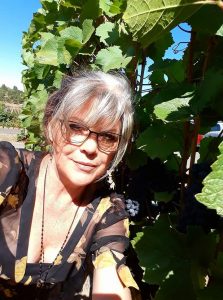 Alice looks blankly at the magazine as Kimberly Clark turns the pages, pointing to various pictures. “What do you think of this? Or this?” she asks, pointing to a rose, a table set for tea, a bundt cake. When Kimberly touches a picture of a train, Alice smiles. Although Alice, who is living with dementia, can no longer tell her own stories, Kimberly has heard tales of her adventurous past. When Alice was a restless young woman, she and her new husband occasionally jumped on a freight train and took a ride. This photo will be the centerpiece of the collage they are making. As Program Coordinator at ARC Jackson County, a lifespan respite program in Medford, Oregon, Kimberly is an expert at creating low-cost, engaging activities for people who are living with dementia.
Alice looks blankly at the magazine as Kimberly Clark turns the pages, pointing to various pictures. “What do you think of this? Or this?” she asks, pointing to a rose, a table set for tea, a bundt cake. When Kimberly touches a picture of a train, Alice smiles. Although Alice, who is living with dementia, can no longer tell her own stories, Kimberly has heard tales of her adventurous past. When Alice was a restless young woman, she and her new husband occasionally jumped on a freight train and took a ride. This photo will be the centerpiece of the collage they are making. As Program Coordinator at ARC Jackson County, a lifespan respite program in Medford, Oregon, Kimberly is an expert at creating low-cost, engaging activities for people who are living with dementia.
Creating collages is easy, inexpensive, and relaxing. Medical offices will donate their old magazines and she also collects periodicals from friends. If Kimberly knows her client’s family stories, she seeks magazines that have illustrations relevant to them. She lays out a variety of magazines and asks, “Which one do you want to look at first?” They sit together and Kimberly slowly turns pages, listening for comments, watching body language, and facial expressions. When she sees interest or excitement, she may ask, “What are you looking at?” or “What does this remind you of?” She then tears out the picture and sets it aside, so it’s not distracting. Once they have a nice group of photos, they start on the collage, cutting and pasting together.
“The project is empowering and can spark discussion,” Kimberly says. “Plus, we can take our time and we have something artistic and interesting to discuss when it’s done.”
She often uses the finished collage again and again as a conversation starter.
Kimberly also engages people through simple nature walks, where they notice the colors, shapes, wildlife, and collect vibrantly colored leaves, pinecones, acorns, and more.
She celebrates people’s individuality by writing their name on watercolor paper in black marker and inviting them to fill in the letters and surroundings with colored pencils.
When people need a little exercise and a good laugh, she invites her dog to join them in a sparkling game of balloon volleyball. Her dog is an expert at keeping the balloon aloft and soon everyone is supporting him in this uplifting endeavor.
“Even if you’re not in a good mood, doing some kind of art, exercise, or creative project makes you stop and appreciate the present,” Kimberly says.


KC Memory Cafe Creates The Sounds of Music: A Visit from the Kansas City Symphony
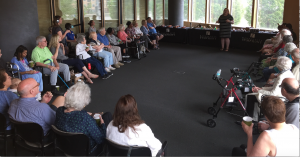 If there’s anything more fun than a one-man band, it’s a one-woman orchestra. On May 15, Margaret Halloin graced the cafe with an astonishing array of instruments. She invoked our inner Itzhak when she introduced us to the versatility of the violin. One moment she used a series of chords to transport us to a hoedown; then she built the tension by creating the sounds of of a chase scene. We were mellow with the cello and sliding cool with the trombone. We could all feel the beat as she tapped and shook a variety of percussion instruments. And then, she invited all of us to play
If there’s anything more fun than a one-man band, it’s a one-woman orchestra. On May 15, Margaret Halloin graced the cafe with an astonishing array of instruments. She invoked our inner Itzhak when she introduced us to the versatility of the violin. One moment she used a series of chords to transport us to a hoedown; then she built the tension by creating the sounds of of a chase scene. We were mellow with the cello and sliding cool with the trombone. We could all feel the beat as she tapped and shook a variety of percussion instruments. And then, she invited all of us to play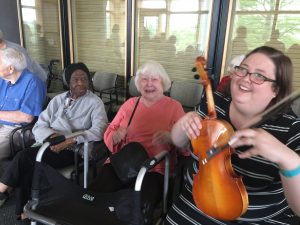 Instantly the room transformed from a quietly listening group of adults to a boisterous band of emerging musicians. One couple beat on a drum together. A woman tentatively held the violin. When Margaret helped her coax a sound of out it, she burst into delighted laughter. People tried the cello, the gong, the bongos, and the French horn. Even better than the sounds of music were the spurts of laughter and the lively conversations. After our chaotic impromptu concert, we gathered in small groups to talk about the music in our lives. One man had been a professional pianist. Several people had played in marching bands. Some had never touched an instrument. Until today.
Instantly the room transformed from a quietly listening group of adults to a boisterous band of emerging musicians. One couple beat on a drum together. A woman tentatively held the violin. When Margaret helped her coax a sound of out it, she burst into delighted laughter. People tried the cello, the gong, the bongos, and the French horn. Even better than the sounds of music were the spurts of laughter and the lively conversations. After our chaotic impromptu concert, we gathered in small groups to talk about the music in our lives. One man had been a professional pianist. Several people had played in marching bands. Some had never touched an instrument. Until today. 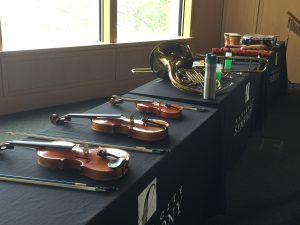
- Invite several musical kids/friends/relatives to come over, tell you about their instrument, and help you make a sound on it.
- Have fun playing imaginary instruments along with a big band or big orchestra music.
- Listen to favorite instrumentals and talk about any memories evoked.
- Look at pictures of various instruments and share stories. Ask open-ended questions with no right or wrong answers, such as, “ What do you think about the piano?” “What are some of your favorite instruments?”
Please join us for our next events:




